Inspired by her karung guni grandfather, she started Commenhers to make upcycling cool and accessible
Nuryanee Anisah Mohamed Noor grew up watching her family practise sustainability before it became a buzzword. Now, she runs Commenhers, a company that makes upcycling easy by turning reusable materials into new products and providing jobs for vulnerable women.
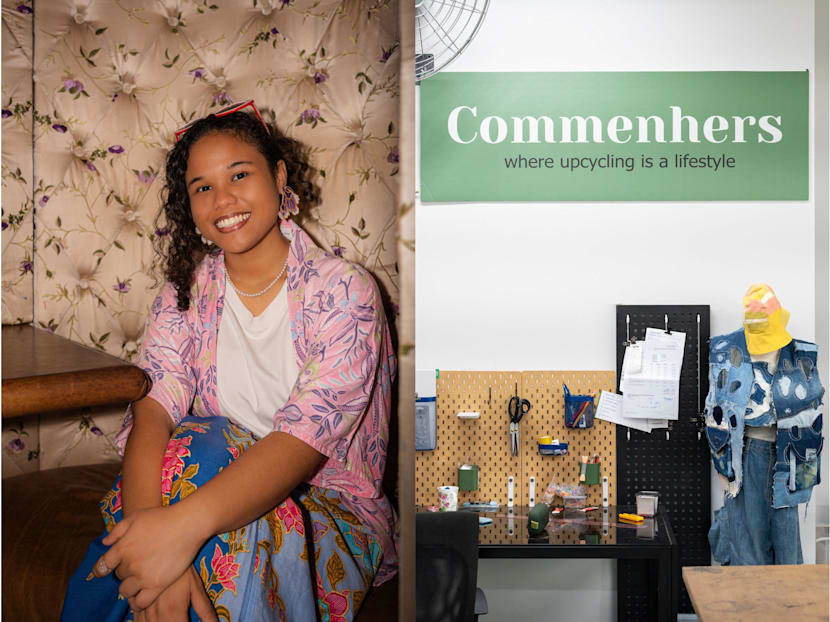
Nuryanee Anisah Mohamed Noor is the co-founder and chief executive officer of Commenhers, a sustainability company aiming to make upcycling easy. (Photo: Commenhers)

This audio is generated by an AI tool.
When I first stepped into the Commenhers studio located in Ubi, the one thing that stood out to me was the mess.
There were scraps of fabric, recycled plastic, heaps of paper, sewing kits, shopping bags from various brands – Ikea, Spotlight, Daiso, Uniqlo – some with logos that looked at least a decade old.
I could barely see the floor, which was covered with plastic containers holding items like fabric flowers, bags and pouches patched together from different materials, upholstery, and what seemed like blankets and mattress toppers.
There was no air-conditioning. Ventilation came from two open windows and two heavy-duty industrial fans that hummed loudly.
But Commenhers’ co-founder and chief executive officer, Nuryanee Anisah Mohamed Noor, seemed completely at ease in the chaos.
She laughed as she explained that the mess was a “necessary evil”. The team was gearing up for several upcoming upcycling workshops with different companies, where participants would learn about upcycling – the creative process of turning waste into something new – and technical skills such as basic stitching.
“This mess is part of the process,” the 25-year-old National University of Singapore (NUS) undergraduate told CNA Women. “It’s an eyesore, but it won’t be here for long.
“Our small team of four full-timers needs to prioritise the workshop and other tasks, and sometimes, that means embracing this mess, or at least directing our eyes away from it.”
The name Commenhers was created by merging the words “commoners”, “men”, and “hers”, to emphasise the company’s inclusivity.
Commenhers serves as a bridge between reducing corporate waste and creating livelihoods for women.
The company works with businesses to transform unused textiles and other discarded materials into upcycled products, from bags to small pieces of furniture. It does this by engaging women from vulnerable backgrounds, including the elderly, single mothers, and stay-at-home mums from low-income families, who carry out the upcycling work while honing their sewing and craft skills.
“We run on tactile, hands-on experiences,” Nuryanee said. “Seeing all this clutter doesn’t feel strange or wrong. In fact, it can even be where a lot of cool ideas are born.”
INSPIRED BY HER FAMILY’S CARE FOR THE EARTH
“Upcycling and sustainability sound new, but many of us Asians have practised sustainability for generations,” Nuryanee said. “I grew up seeing my parents turn old clothes into rags, and reuse bottles or empty containers multiple times before throwing them away.”

She added: “My late paternal grandfather – who I sadly never got to meet – was a karung guni, a rag-and-bone man who collected cardboard, newspapers, and other materials.
“Back then, he did it mainly to earn a living, but being a karang guni also allowed him to save scraps and turn them into other valuable items – and honestly, that’s the OG (original) upcycler.”
This was what inspired Nuryanee to start Commenhers as a school project in 2019, when she was a first-year business administration student at Singapore Polytechnic. Her group of five, including co-founder Ye Htut Linn, decided on a project that would “make upcycling cool and easy to do”.
The group started by reaching out to corporations such as PSA Singapore to procure their unused textiles, such as old uniforms or fabrics with defects. When Nuryanee saw its “large potential”, she realised they were onto something important.
“It wasn’t just a fun school project. It’s something real, something meaningful,” she said.
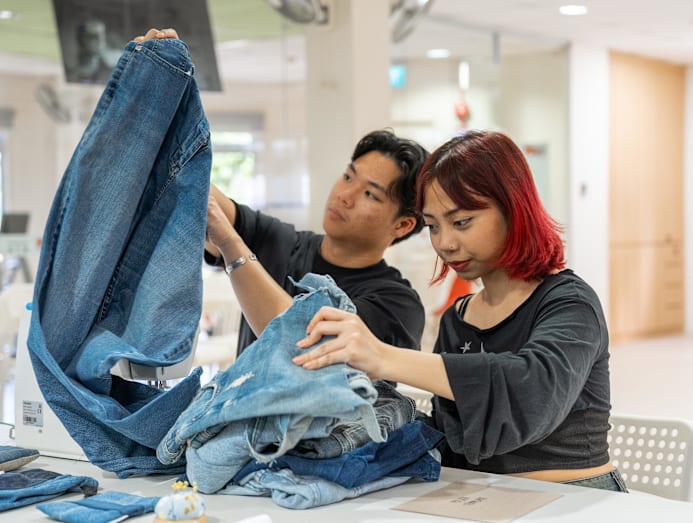
“Upcycling is very tangible and hands-on,” Nuryanee said. “In this digital age, that can feel like a difficult, slow process. But once you see the results, once you hold the pouch or wear the new clothes, it feels so worth it.
“I wanted to share that feeling with as many people as possible. Working on Commenhers is like paying homage to how I was raised to value every item around me.”
While Commenhers started as a semester-long project for school and the others in the group went on to pursue other ventures after graduation, Nuryanee and Ye saw its potential.
Throughout their time in polytechnic, from 2019 to 2022 – during which she consistently made the honours roll – the two co-founders reached out to more companies and experimented with different forms of upcycling.
After she earned her diploma, Nuryanee enrolled at NUS as a business administration student and continued building Commenhers with Ye.
A PLATFORM FOR WOMEN TO HONE THEIR CRAFTING SKILLS
From the start, Nuryanee felt it was important to involve the community: “My parents often brought me out to do volunteer work, so when I started my project, I knew I had to involve the community, too.”
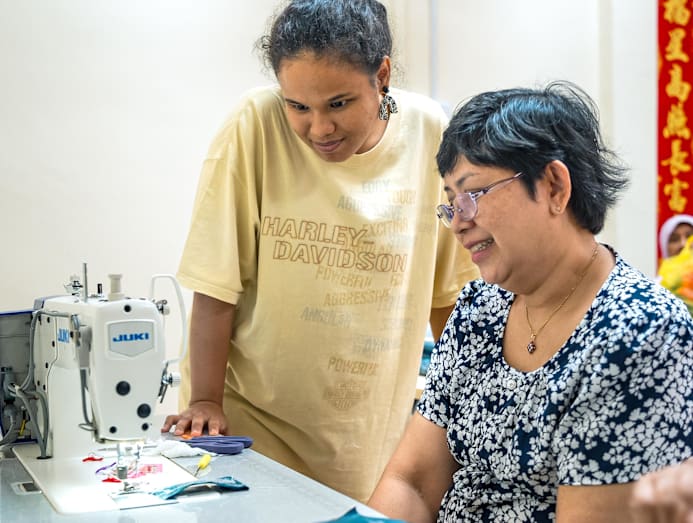
To get help with upcycling, Commenhers reached out to non-profit organisations that support women through reskilling and employment programmes, such as Daughters of Tomorrow and PPIS (the Singapore Muslim Women’s Association).
“They already have strong networks of women who can sew and are looking for work opportunities – we provide that bridge,” said Nuryanee.
“I believe sustainability is very related to women. They’re the great minds behind caring for the home and children, managing costs, and finding ways to reuse and save – it felt natural to work with women.
Over the last six years, Commenhers has provided jobs to hundreds of women and currently employs over 100 of them. These women earn a supplementary income by turning large amounts of textile waste into new, saleable products like pouches, bags, and clothes.
Commenhers also set up four sewing spaces in Jurong East and Kallang to give their makers a comfortable space to work closer to their homes.
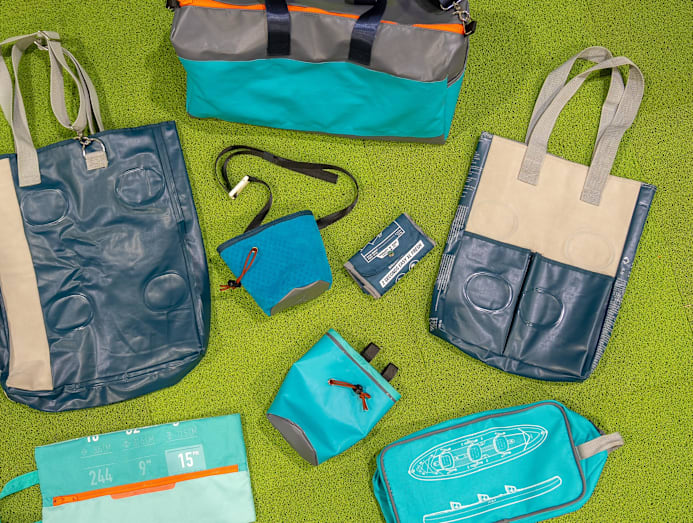
Their ongoing collaboration with Decathlon, which started in 2024, led to a range of upcycled products made by the women, including duffel bags made from old kayak bags and tents, and chalk bags from torn air mattresses. These products are available on Decathlon’s website or at their Kallang outlet. Prices range from about S$10 to over S$100.
Commenhers has also worked with over 30 businesses that have surplus textiles, creating upcycled products for sale or as corporate gifts.
For example, old or defective batik fabric from Singapore Airlines is turned into cutlery pouches and fabric flowers, given as door gifts to the airline’s business partners or event attendees. Other collaborators include the Singapore Art Museum, local fashion labels like Wacky Wears and Dirty Manners, and global brands such as H&M.
Commenhers also rallies volunteers to run upcycling workshops and programmes for a wide range of groups, including students and bank employees.
THE IMPORTANCE OF SLOWING DOWN
For her contributions, Nuryanee has received several accolades, including a spot on this year’s Sustainability Leadership Youth A-List, which honours young changemakers in environmental causes, and the National Environment Agency’s NEA EcoFriend Award in 2024, which celebrates individuals dedicated to protecting the environment.
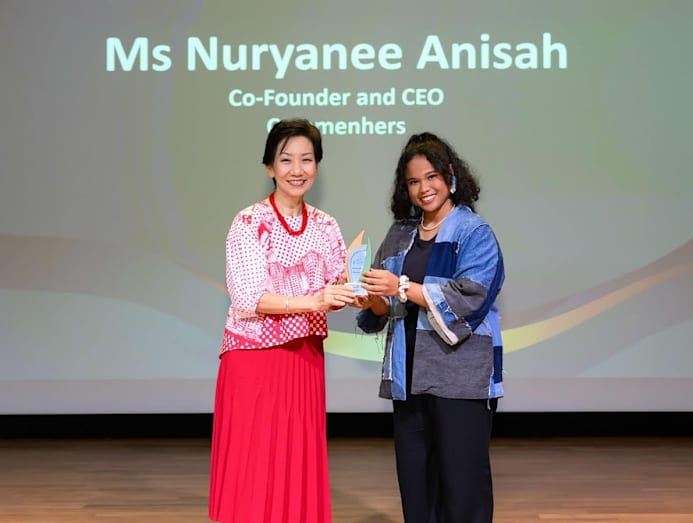
Running Commenhers, however, came at a cost: Burnout.
“I know I’ve achieved a lot, but being an entrepreneur is not all glamour; I get very tired and overwhelmed, too,” she said.
“There have been many nights in the past few years when I’d sleep for only two to three hours a day,” Nuryanee admitted. “I got so anxious about needing to work hard. And despite all our achievements, I still sometimes question if I’m doing anything productive or meaningful.”
It was only recently that she remembered another reason she started Commenhers: To slow down. To slow down consumption, to slow down waste, and now, to slow down her own work and processes.
“I want to live up to the values my family has instilled in me, so I also remind myself that it’s important to rest and take a deep breath, and remember the slow living that my late grandfather lived by.
“He worked hard so that all of us could have a good life. I should remind myself that I can and should take a break sometimes, too.
“I feel so much for Commenhers because a lot of people can be jaded when it comes to sustainability,” she said. “Sometimes, people roll their eyes when they hear what we do.
“With climate change and big corporations contributing to a lot of environmental damage, people have kind of lost faith in sustainability these days. Commenhers shows that there’s always something that can be done, no matter how small the impact.”
CNA Women is a section on CNA Lifestyle that seeks to inform, empower and inspire the modern woman. If you have women-related news, issues and ideas to share with us, email CNAWomen [at] mediacorp.com.sg.






